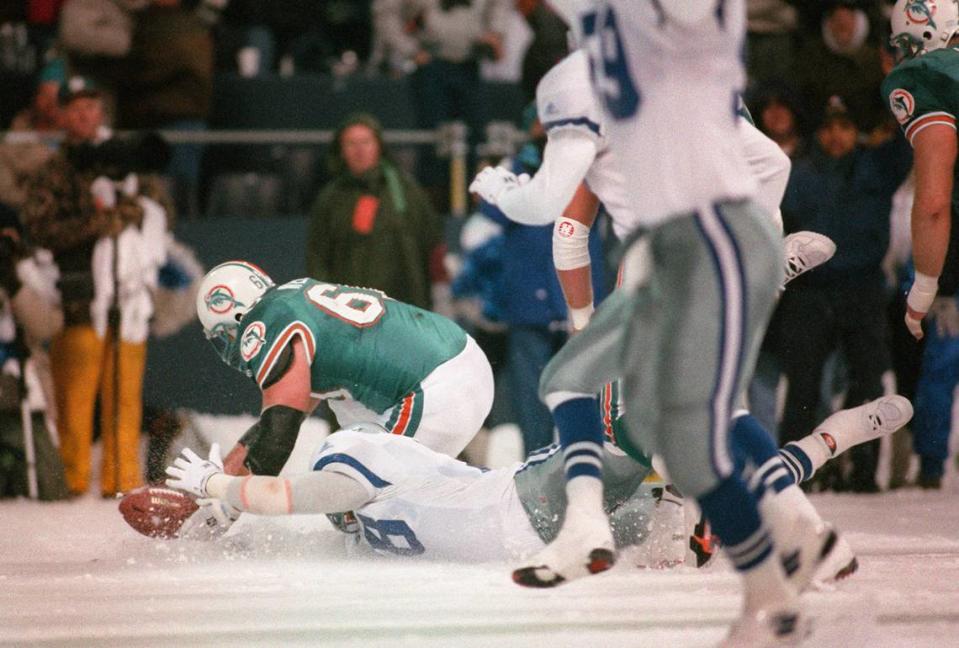
Leon Lett Blocked Field Goal: Revisiting the 1993 Thanksgiving Day Blunder
Introduction
On November 25, 1993, in the heat of a thrilling Thanksgiving Day clash between the Dallas Cowboys and the Miami Dolphins, an unforgettable blunder occurred that etched itself into NFL history. Defensive lineman Leon Lett’s infamous blocked field goal attempt not only cost the Cowboys the game but also sparked a lingering debate about the complexities of sportsmanship, ethics, and decision-making in the face of high-stakes competition.
The Blunder
With the Cowboys clinging to a 14-13 lead in the closing seconds of the game, the Dolphins lined up for a potential game-tying field goal. As kicker Pete Stoyanovich prepared to send the ball soaring through the uprights, Lett surged forward and blocked the kick. The ball fell into the end zone, where Lett inexplicably decided to pick it up and attempt to return it. However, he was caught from behind and tackled by Dolphins cornerback Keith Jackson, securing Miami’s 16-14 victory.
Perspectives and Analysis
The Cowboys’ Perspective
Cowboys coach Jimmy Johnson was furious with Lett’s actions, believing he had violated the team’s “no return” policy. Lett later claimed he was unaware of the policy and simply reacted instinctively, hoping to give his team a chance to win. Defensive coordinator Dave Wannstedt argued that Lett’s mistake was a result of poor judgment and a lack of discipline.
The Dolphins’ Perspective
Dolphins coach Don Shula and players were elated with the victory, crediting Jackson’s tackle for saving the game. However, some questioned the ethics of Lett’s decision, arguing that he should have allowed the ball to go into the end zone for a touchback, giving the Cowboys another chance to possess the ball.
The Sportsmanship Debate
The incident sparked a fierce debate about sportsmanship in professional sports. Some argued that Lett’s attempt to return the ball was a desperate and unethical move, while others defended his actions as a competitive instinct. The NFL later clarified its rules, stating that a player cannot advance a blocked field goal if it lands in the end zone.
Real-Life Consequences
The blunder had a profound impact on Lett’s career. He was benched for the remainder of the 1993 season and traded away the following year. The incident also tarnished the Cowboys’ reputation and became a source of ridicule and mockery. Despite his subsequent apology and efforts to make amends, Lett’s legacy remains forever intertwined with this infamous Thanksgiving Day mistake.
Broader Implications
The Leon Lett blocked field goal blunder highlights the complex nature of decision-making in sports. In the heat of competition, athletes face immense pressure to succeed. While competitiveness is essential, it should not compromise the integrity of the game or undermine the values of fair play and sportsmanship.
Furthermore, the incident raises questions about the role of coaches and teams in guiding players’ decisions. Clear communication and well-defined rules can help prevent costly blunders and ensure that players act in accordance with the best interests of the team and the sport as a whole.
Conclusion
Leon Lett’s blocked field goal blunder is a cautionary tale that transcends the realm of football. It serves as a reminder of the importance of sportsmanship, ethical decision-making, and the consequences of actions taken in the heat of competition. While the incident has been dissected and debated for decades, its significance lies in its ability to spark conversations about the complexities of human behavior and the enduring principles of fair play.
